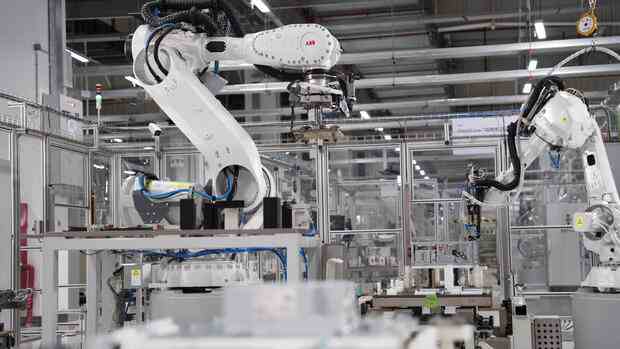With the new, fully automated factory, the group has tripled its capacities.
(Photo: ABB)
Munich With one of the most modern robot factories in the world, ABB wants to maintain its market leadership in China. “We are number one and we want to consolidate this position,” ABB robotics boss Sami Atiya told Handelsblatt. The new production facility near Shanghai will open this Friday.
With the investment of 150 million dollars, the Swiss group is taking a risk despite the growing global tensions, especially between the USA and China. “We are convinced that this investment makes sense,” said Atiya. ABB has been there for decades and China is the largest and fastest growing market for robots: “There’s no getting around that.”
With the new, fully automated factory in Kangqiao, ABB has tripled its capacities. “We have equipped the plant with all the modern technologies that we have,” said Atiya. There are no longer rigid assembly lines, but flexible, modular production cells that are operated by autonomous mobile robots.
China is the most important sales market for the robotics industry
IRB1200 series robots produce examples of the same model. “Robots build robots, for us that’s a prime example of the factory of the future,” said Atiya. 90 percent of the manufactured machines are to be sold in China, the rest on other Asian markets. The two ABB factories in Sweden and the USA serve the rest of the world.
Top jobs of the day
Find the best jobs now and
be notified by email.
Kenji Yamaguchi, head of world market leader Fanuc, was also optimistic about China. Political problems could only temporarily weaken the development, he told the Handelsblatt. “The demand for robots is higher than ever.”
China is the largest and most important sales market for robot manufacturers. Last year, every second new copy worldwide was set up in the country for the first time. Sales there increased by 44 percent to 243,300 robots sold. “China still has great potential for further growth,” said Marina Bill, President of the World Industry Association IFR.
“We are convinced that this investment makes sense,” says the ABB robotics boss.
(Photo: ABB)
With a robot density of 246 machines per 10,000 workers, China is already in ninth place globally. For comparison: ten years ago there were just ten robots. The most important customer is the electrical and electronics industry, which set up 81,600 new robots in China last year. The car industry took off 50,700 machines.
The suppliers must therefore be present in China if they want to benefit from the high growth rates. In view of the growing political tensions, however, the risks also increase if, for example, the conflict between the USA and China escalates and new trade barriers are set up.
As a result, investments in China are now viewed more critically. Siemens, for example, plans to double the sales of its main division, Digital Industries, in China by 2025. This project called “Marco Polo” is not without controversy internally.
ABB bet on China early on
In recent years, the production of many Western companies has also been made more difficult by China’s rigid corona policy. There were protests in many cities, against which the government proceeded with increasing repression. “We are closely monitoring the situation and hope everything will be resolved peacefully,” Atiya said.
ABB is now emphasizing that the new model plant will primarily develop and produce “in China for China”. A research department is also housed on the 67,000 square meter site.
ABB relied heavily on China early on and was long considered the market leader. Meanwhile, Japanese competitors such as Fanuc and Yaskawa have increased. Kuka is now also benefiting more from being part of the Chinese Midea Group. In the third quarter, the Augsburg-based company was able to more than double sales in the country to 288 million euros.
After the takeover by the household appliance manufacturer Midea, Kuka’s business in China initially did not grow as quickly as ex-boss Till Reuter in particular had hoped. For some Midea plant managers, the robots were too complex and too expensive. In the meantime, Kuka has developed simpler models and also benefits more from the parent company’s sales network.
Western and Japanese groups still dominate, particularly in the higher-end segments. But China has strong ambitions to create its own strong suppliers. Robotics is “the key technology of modern industry,” said Song Xiaogang, secretary-general of the China Robot Industry Alliance (CRIA). The topic is therefore a high priority in the government’s new five-year plan.
More: New corona lockdowns choke off the economy in China.
